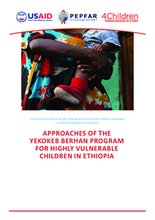In this case study, Coordinating Comprehensive Care of Children (4Children) documents and evaluates the work of Pact's Yekokeb Berhan Program for Highly Vulnerable Children (HVC) in Ethiopia. The case study is one of three case studies developed by 4Children at the request of the Office of HIV and AIDS at USAID to share and promote learning from OVC programs which have implemented successful interventions to increase HIV testing and services (HTS) for children.
This case study includes a background on Ethiopia and the context of its health and social welfare services, a description of Pact's Yekokeb Berhan Program, as well as program results, including promising practices and remaining challenges.
The Yekokeb Berhan program seeks to increase HTS through a large, comprehensive response to child vulnerability. Designed to improve the accessibility and quality of services for HVC, Yekokeb Herhan focuses on strengthening systems and structures of both government and civil society, with attention to the improved coordinated delivery of seven core services: 1) economic strengthening, 2) educational support, 3) food and nutrition, 4) health care, 5) legal protection, 6) psychosocial support, and 7) shelter and care. The program provides support to both HVC and their caregivers and offers a multitude of services pertaining to family strengthening, including one-on-one counseling, community conversation groups, savings and loans group meetings and life-skills support groups.

